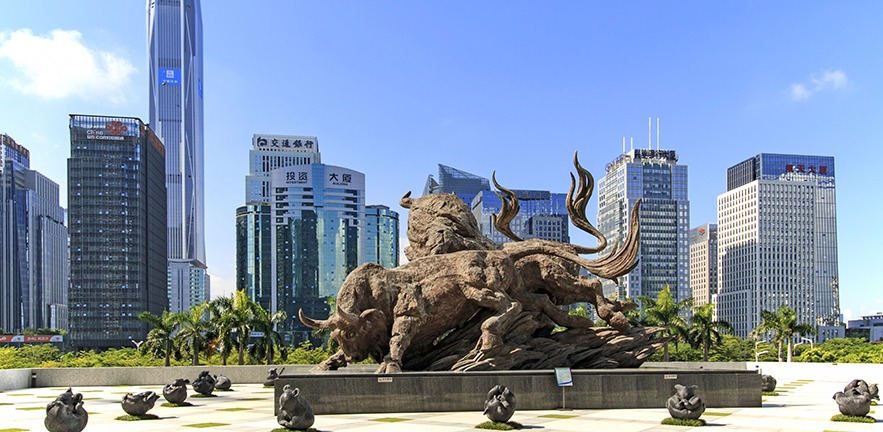The President of the Stock Exchange Executive Council in China, Wang Boming, says the founding 30 years ago of stock exchanges in Shanghai and Shenzhen ushered in a vibrant “market economy with Chinese characters”.
In an interview with Christoph Loch, Dean of Cambridge Judge Business School, Boming says that state-owned enterprises (SEOs) comprised 90% of Chinese businesses in the 1980s but that has changed dramatically in the past 3 decades – with private enterprises now contributing half of China’s tax revenues, 60% of gross domestic product and 70% of technology investment, while accounting for 80% of new urban employment.
“So now there’s a private sector that is meaningful, that is good for the country, good for the system,” said Boming, an architect of the creation of the stock exchanges in China three decades ago.
Besides heading up the Stock Exchange Executive Council, Boming is now also Chairman at SEEC Media Group and Editor in Chief of CAIJING Magazine. He is a member of the China Advisory Council of Cambridge Judge Business School.
Boming was working at the New York Stock Exchange in the late 1980s when he had a vision to create a stock exchange in China. Together with a small group of colleagues, they began to conceptualise and create the new stock exchanges in Shanghai and Shenzhen, which began operations in December 1990. This project was undertaken at a time when the Chinese economy was still exclusively a central planned economy and was quite a visionary and forward-thinking undertaking.
The interview with Dean Loch is the latest in a series entitled CJBS Perspectives: Leadership in Unprecedented Times, organised by the Alumni & External Engagement and Executive Education teams at Cambridge Judge.
The interview
Here are edited excerpts of the interview:
Dean Loch: “In our previous interviews in this series we have talked about the unprecedented times being today; today we’ll talk about something unprecedented that happened 30 years ago. What motivated you do something that many people said was impossible?”
Wang Boming: “You have to understand where China was 30 years ago. China started its economic reforms at the end of the 1970s – it was at the time a planning economy, we didn’t have private enterprises, everything was planned. What we had been doing in the 1970s and 1960s wouldn’t work anymore in China, we would be in poverty. I was excited by the process of the transition from a planning economy to a market-oriented economy – and to have a really good market, capital has to be allocated not by a central institution.”
Dean Loch: “You said people understood that things couldn’t continue as in the past, but you are introducing the Antichrist, the symbol of capitalism into a country going through transition. So, what was the hardest thing about putting this in place?”
Wang Boming: “The hardest thing was that in the 1980s if you talked about capital you would be criticised. So, in Shanghai and Shenzhen we initially used the term ‘securities exchange’ rather than ‘stock exchange’, because stock had a connotation of exploitation, capitalists. We had to explain in the simplest terms what a securities market was all about, so we used the example of the market for vegetables, or pork. What we said was: ‘We’re having a market that sells securities for a price, you understand that?’ And they said: ‘Somewhat’”.
Dean Loch: “Thirty years later, has the stock market created value for the Chinese people?”
Wang Boming: “It’s tremendous. In the beginning there were 8 listed companies in Shanghai, 5 in Shenzhen, and there are now 4,000 listed companies with a market capitalisation of about $12 trillion. It’s big, second to the United States. Most importantly the system has now transitioned from a planned economy to a quasi central/quasi market-driven economy. We didn’t have wealth before: we had enough to feed ourselves, clothe ourselves, but now a lot of wealth is being created.”
Dean Loch: “Are the stock exchanges in China just like the New York Stock Exchange, or are there differences?”
Wang Boming: “If you talk about the technical aspects, they are pretty much the same: we have a regulatory body that governs the IPOs (initial public offerings), and rules prohibiting irregular trading. But in the bigger picture we’re not a fully market economy, we do have State Owned Enterprises (SOEs). Most of our listed companies are private enterprises, but if I talk about the capitalisation or total profit generated by listed companies the SOEs get a bigger chunk, 60% or probably 70%; we have 5 or 6 state-owned banks, they are SOEs, they’re big. So it’s somewhat of a market economy but with Chinese characters, it’s different from a free market economy in the United States.”
Dean Loch: “Where will the Chinese market be in 5 or 10 years?”
Wang Boming: “It depends on how the Chinese economy is growing and how the Chinese equity market is internationalised. We have to continue our economic reform, our open door policy, we have to be interactive with the international economy. Of course, we have a lot of other challenges we have to deal with, but as long as we do that a bright future will be there 5 or 10 years from now.”


